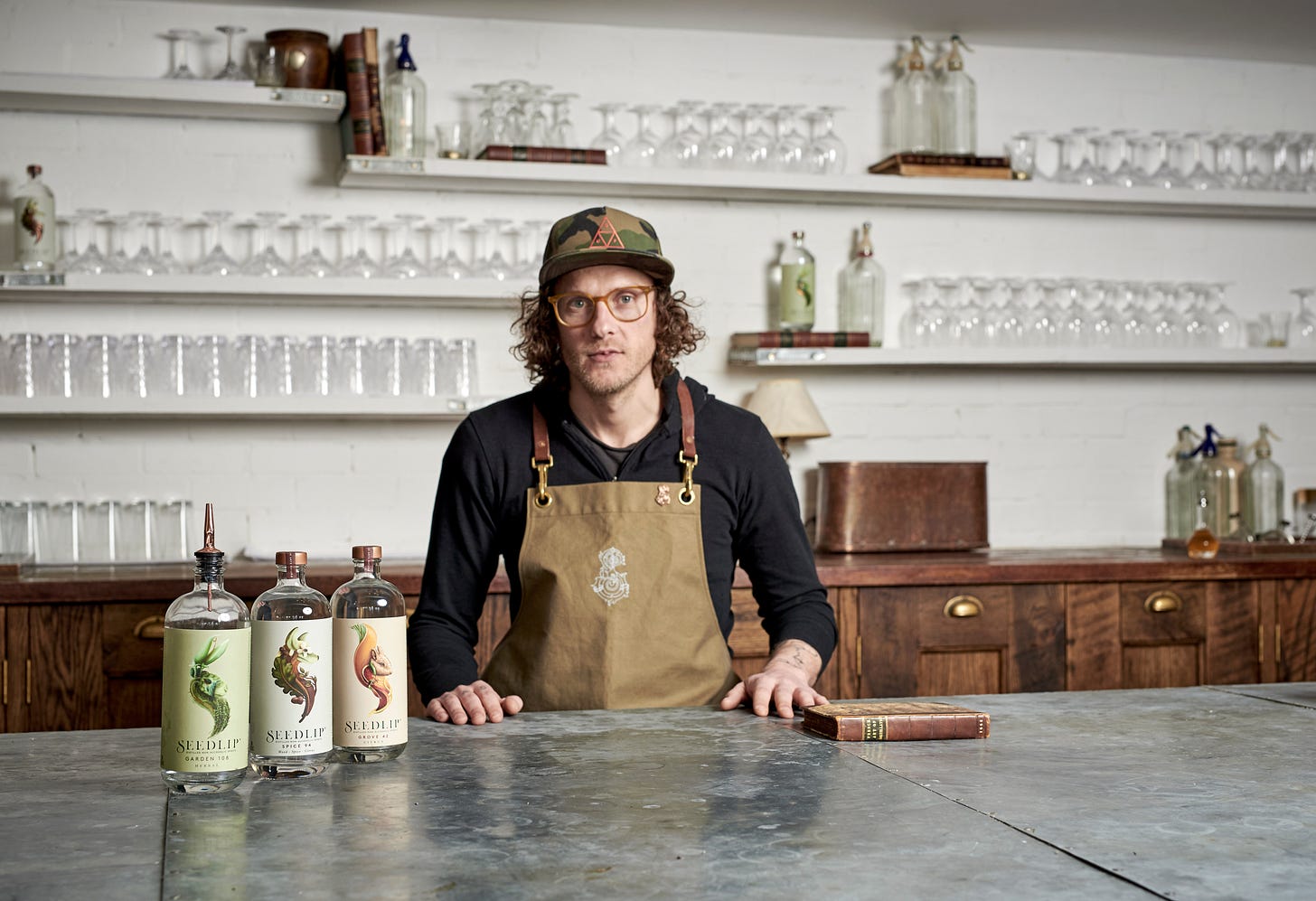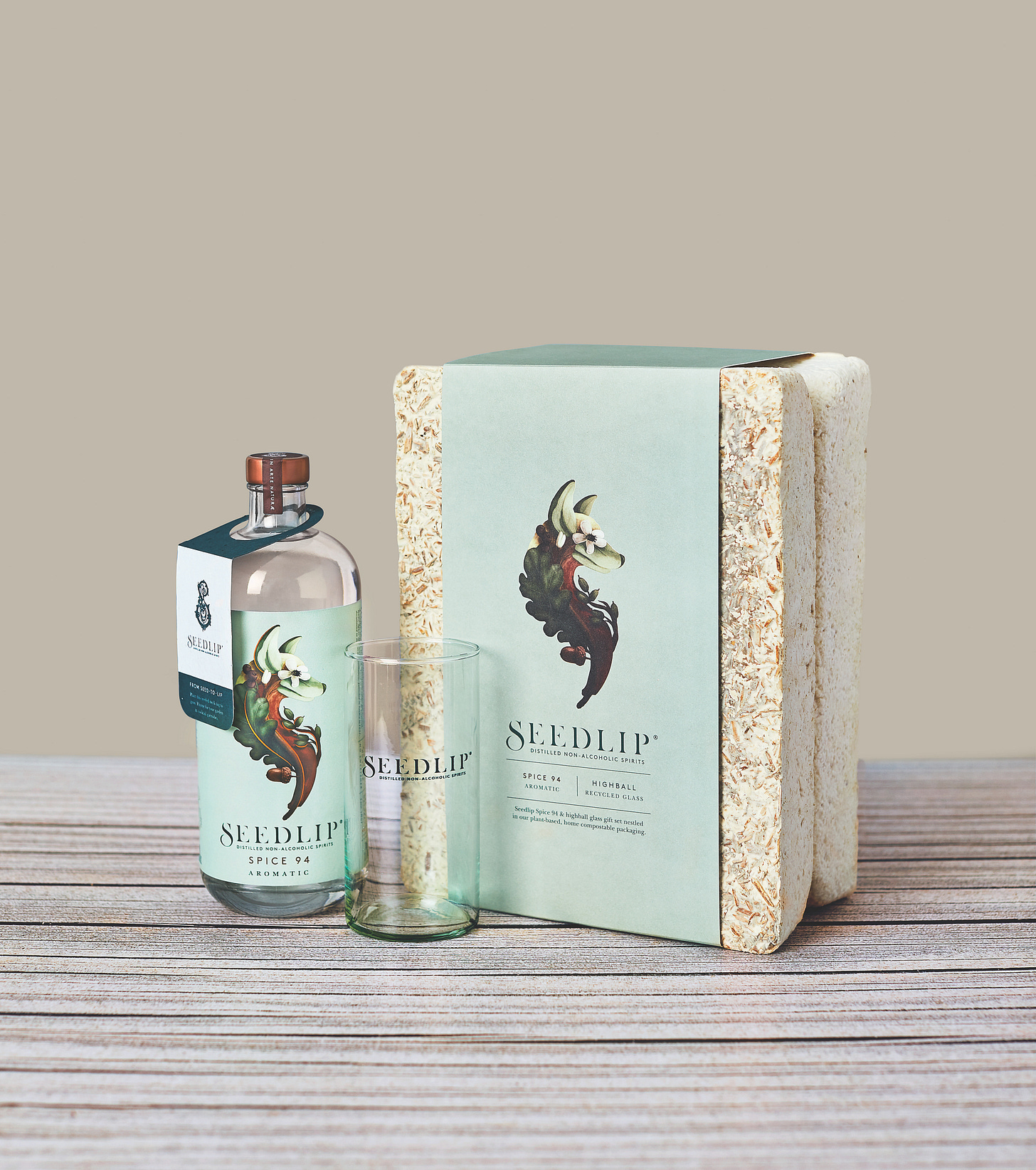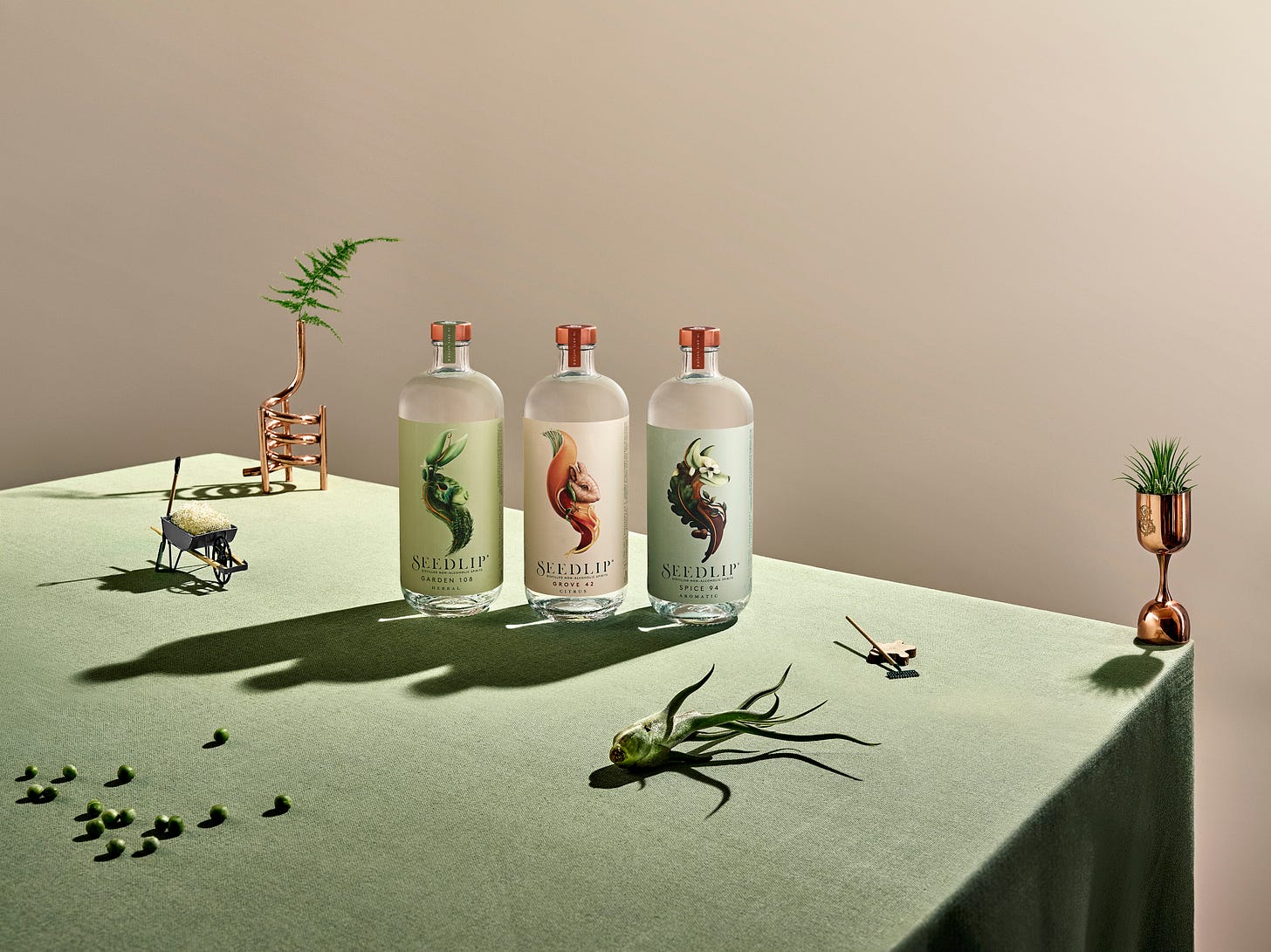💥 #5 - Meet the Brands: Seedlip - 0% alcohol pledges 1% for the Planet.
Featuring Ben Branson, Founder of Seedlip.
Solving the dilemma of ‘what to drink when you’re not drinking’, Seedlip are the world’s first distilled non-alcoholic spirits. Inspired by 17th century herbal recipes, blending innovation with nature is how Seedlip was created. Rapid growth over the last 5 years now sees the core range of Seedlip Spice 94, Seedlip Garden 108 and Seedlip Grove 42 sold in 37 countries worldwide. However, founder Ben Branson has continued his family’s 300-year farming heritage through the creation of a highly modern brand that hasn’t forgotten its roots.
We caught up with Ben amidst a very exciting week to hear more about his motto of being ‘a nature company that makes drinks’, and dig deeper into what Seedlip have been brewing, or distilling, behind the scenes this past year. With a Life Cycle Analysis under their belt, and carbon neutral on the horizon, they’ve certainly been busy.
We’re never going to be the greenest company in the world, we make glass bottles of liquid that are sold globally. However, what we can do is have rigour when calculating our carbon footprint, do our best to create the least impact possible, and do what we love by connecting people to the wonders of nature.
👉 It’s a busy week for Seedlip - what are you announcing?
We’re now a 1% for the Planet member! Seedlip will be giving 1% of global annual revenues from sales of Seedlip non-alcoholic spirits each year to environmental charities, which is an exciting step forward for the brand’s commitment to help protect the natural world.
This comes after our parent company, Diageo, launched its ten-year sustainability plan, Society 2030: Spirit of Progress, in November 2020. Diageo’s action plan has been designed to help create an inclusive and sustainable world, and working alongside 1% for the Planet will ensure that our environmental giving is credible and strategic, and that our impact is amplified globally.
Why did you choose the 1% for the Planet pledge?
Seedlip has been built from nature. From the ingredients in the liquid and the design of the label, to the naming of the Seedlip blends. We recognise the value of nature’s ingredients and understand the need to protect those resources. Put simply, if there’s no nature, there’s no Seedlip.
Another reason is the clear consumer facing message of 1% for the Planet. There’s a lot of information out there, and we want our consumers to understand the kind of company that they’re interacting with. That’s why we’re also pending B Corp. We want to align ourselves with pledges and certifications that are rigorous with their process, whilst simple for consumers to understand. They care about where they buy from, but we know that they're overwhelmed with choice.
👉 What steps have you taken to evaluate Seedlip’s impact?
We’ve just completed a Life Cycle Analysis for Seedlip Spice 94, Seedlip Garden 108 and Seedlip Grove 42. This gave us great insight and detail into our entire business, and has led us to innovate in areas like our packaging, with the aim of reducing our environmental footprint. From here, we plan to mitigate our carbon footprint, and offset what we can’t reduce, to make us carbon neutral by 2022.
👉 What was the catalyst for digging into Seedlip and seeing where you could reduce your impact?
It’s like buying a red car, and then suddenly noticing everyone else’s. Or, the lightbulb moment of realising that orange juice is a pretty dreadful non-alcoholic option if everyone else is having nice cocktails. As soon as you realise it, you can’t ignore it. It's the same for the environment and sustainability, once you understand and appreciate that there is a climate crisis you can’t ignore it.
There’s so much energy in this space, from 1% for the Planet and B Corp to carbon neutral or Net Zero pledges. It’s brilliant, and it's the hot topic at the moment, but I really hope this energy lasts. I really hope that sustainability becomes an absolute hygiene factor. Just like how I hope it becomes normal to get a great drink, whether you're drinking alcohol or not, I hope that it’s normal to buy from brilliant companies that you trust. It should be abnormal to not have fantastic environmental targets and sustainability policies.
👉 I love that you refer to it as a hygiene factor - it’s so important for brands to be thorough. On that note, most brands calculate their carbon footprint first, why did you start with a Life Cycle Analysis (LCA)?
The last 12 months has been pretty interesting, but what it has given us is an opportunity to do a lot of work internally on our business so when lockdown relaxations happen we can come out singing. Because of this, it’s been the perfect time to conduct a Life Cycle Analysis. I couldn't imagine doing it any other way, or going ‘let's be carbon neutral tomorrow by buying offsets’. It's about our understanding of Seedlip, and our understanding of our impact.
We know a lot about our supply chain, because it started from my kitchen. We know where our ingredients come from, and we know our suppliers for components like our glass and paper. We knew a lot, but we didn't have a framework for understanding, analysing and measuring it. Doing a LCA is fascinating, because there is a model and a framework for analysing our environmental impact from seed to bin. It’s an incredibly interesting process for any business to go through, and all businesses should know this information in detail. It's empowering to be able to then make changes, improvements and decisions based on data.
Was it difficult to get the data, and better understand your supply chain?
It's the part that took the longest. There aren’t clear standards for the botanical industry, and we source our 18 ingredients from all over the world. For example, for Seedlip Spice 94 we source the gorilla bark from a family of maize farmers in the Bahamas, and we source our whole spice berries from a single farmer in Jamaica. What took time was communicating with them, as we asked them loads of questions that they've probably never considered. However, that was relatively simple as they’re single sources.
In contrast, Brazil is one of the largest exporters of oranges in the world, and the scale of the orange groves means it takes longer and is harder to get the necessary information. We want to know their growing conditions, transportation routes, the logistics involved in harvesting, so it’s complex and required working with LCA experts. It's been probably the most rigorous and thorough process we've ever been through in terms of analysing all aspects of our business.
Why did you get your LCA peer reviewed?
Getting our LCA peer reviewed was really important to us. I think there is a danger that brands are making claims, and it's not peer reviewed and not certified, so it’s misleading. We wanted to take the time, be thorough and do it properly.
How long did it take you?
It was a nine month process. We finished the peer review in February, and have since been planning our next steps to become carbon neutral.
Who did you partner with to conduct the LCA?
We partnered with Article 13, who were brilliant. We didn’t have that level of expertise in-house, so we needed to work with experts.
👉 Were there any surprises, or emission ‘hotspots’?
I was most surprised at how little is recycled in the US. Lots of glass, and Seedlip bottles, end up in landfill despite our best intentions. I perhaps naively assumed that when anyone finishes a glass bottle they recycle it, but this really isn’t the case in the US. Now, we’re taking a look at how we can work with our customers, use the platform that we've built and educate them about the importance of recycling Seedlip bottles.
We had a couple of good surprises when digging into our ingredients and finding out more about their individual impacts. For example, we discovered that we were using more orange peel from the harvesting process to create our botanicals than we initially thought. We had an idea that we re-used this ‘waste’ in our process, but no detail, so this was really exciting. Now, we’re asking how we can utilise similar by-products when sourcing our other ingredients.
I was also surprised that the impact of having a business that's available in 37 countries, from a shipping emissions perspective, wasn’t as high as I thought it would be. We don’t air courier anything, and when done properly with the right routes and bulk orders, shipping has less of an environmental impact than you might initially think.
👉 What have you done to reduce your emissions?
Whilst we were conducting our LCA we changed our fulfilment provider in the US, as we knew we wanted to cut down road miles in the US. Now, we have closer distribution centres to our customers and our consumers. This has meant that we’ve already reduced our emissions compared to our recently completed LCA, but it’s still great to have the LCA as a starting point that we can set targets from going forwards.
Separately, we’re using innovative companies like Flexi-Hex, Magical Mushroom Co and Earthink to reduce the impact of our packaging. We’ve also switched to carbon neutral delivery in the UK for our D2C website, working with DPD as a partner.
From our ingredients, the LCA has helped us be critical about our sourcing. We’re constantly evaluating options, and now focusing on what difference alternative sources could make in terms of miles shipped and emissions created. Ginger and lemon are two ingredients that we’re looking to source more locally, rather than from South America.
The LCA is a great benchmark from which you can evaluate options.
Exactly, it helps us be objective and focus on what gains we can make, even if they are marginal.
Still gains!
👉 You mentioned that you’re aiming for carbon neutral by 2022. Are you working with Article 13 on this?
Absolutely! Article 13 will be our partners to achieve carbon neutrality. Since we’ve just completed our LCA, we can begin to strategise the roadmap to carbon neutral by 2022. We have the data, we know our supply chain, now we need to continue to reduce our impact and offset emissions that we cannot avoid.
Do you have any plans for particular carbon offsetting projects you want to support?
We don't have a lot of direct operations as a business, so we will need to offset the emissions that are out of our control and are unavoidable. Our ingredients and need for resources already starts to dictate some of the initiatives that we can get involved with, whether that's regenerative agriculture, or focusing on soil health. However, we want to get the balance between where our ingredients come from and where our emissions might be felt the most.
👉 You say that you’re a nature brand producing non-alcoholic drinks. Was being a responsible business always the plan?
When I started Seedlip from my kitchen, I had no idea what was going to happen. Did I think about carrying out an LCA? Absolutely not. I just want to do the right thing, create something unique and see what happened.
Five years later, we’ve reached a level of audience and influence where we can make a difference. We’re never going to be the greenest company in the world, we make glass bottles of liquid that are sold globally. However, what we can do is have rigour when calculating our carbon footprint, do our best to create the least impact possible, and do what we love by connecting people to the wonders of nature. Five years later we can use our voice, and that’s harder to do when you’re a tiny business.
💥 Impact Resources 💥
Interested in doing an LCA for your business? Check out Article 13.
Check out Flexi-Hex, Magical Mushroom Co and Earthink.
Read Seedlip’s interviews with the founders of Flexi-Hex and Magical Mushroom Co on the Seedlip journal.
Find out more about 1% for the Planet, and its origin story, here.
What Next?
Keep up-to-date with Seedlip via their Instagram, Twitter, LinkedIn and Facebook.
Subscribe to the Seedlip newsletter on the Seedlip website.
Try out Seedlip by ordering straight from the Seedlip online shop.






